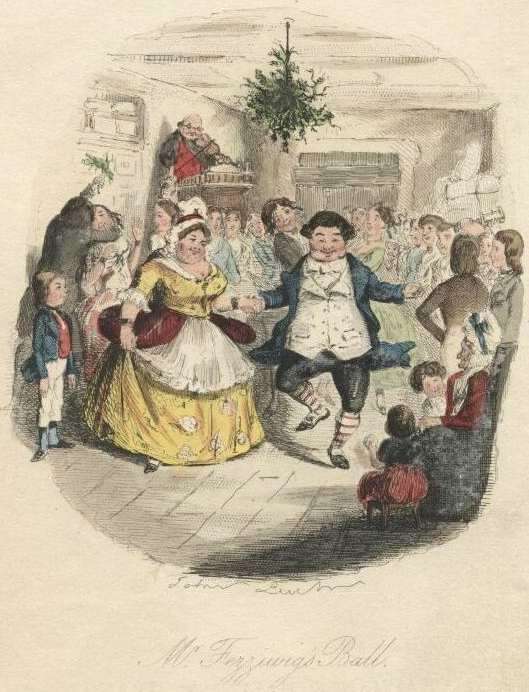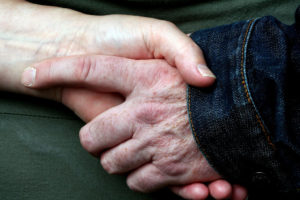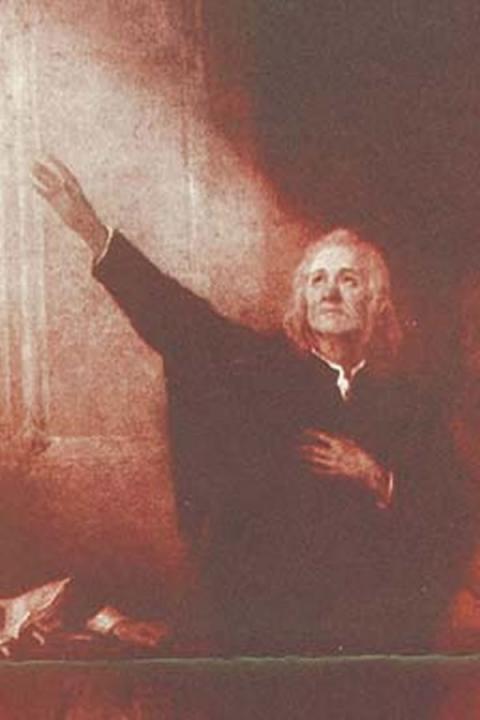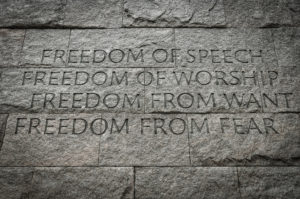Something New
January 3, 2017This month, try something new that you’ve never tried before! This can be something big or something small, but it should be something that is new to you. Here are some ideas:
- Try a new kind of food, especially a new fruit or vegetable.
- Learn how to say some words in a new language.
- Make a new friend or sit with a new person at the lunch table.
- Play a sport you’ve never played before.
- Listen to a different kind of music, or music from another part of the world.
- Learn about how children live in other cultures. There are many organizations that will match people up with pen pals in other countries. (Kids, ask your parents for help with this!)
- Learn the names of your mailman, grocery clerk, school crossing guard, or others who help you every day. You might even give them a thank you card to show them you appreciate them.
A New Freedom of Faith
January 3, 2017Throughout the history of Christianity there have been big fights over changes in religious belief and practice, with different people say their version is the real version.
But King John Sigismund, the one and only Unitarian king in history, had a different point of view. Way back in 1561, John Sigismund was very interested in religion, partly because people in his country of Transylvania kept fighting about it. The Roman Catholics, Lutherans, Calvinists, and Unitarians all argued about whose views about God and Jesus and how church services should be conducted were right.
Finally, King John called the best speaker from each church to come to a place called Torda for a debate to decide who was right. The speaker from the Unitarian church was a man named Francis David. He argued that no one has the right to force people to believe anything about God, and that it’s OK if our understanding of religion changes.
After 10 days, King John ordered the debate to end. But he did not announce a winner; he did not say that any of the four churches was the best. Instead, King John agreed with Francis David, and he created what was called the Edict of Torda, which declared that every church and every person would be free to follow their own beliefs, even if those beliefs changed over time. There are still Unitarians in Transylvania today who share that commitment to freedom of belief.
Read more about Francis David from the UUA’s Tapestry of Faith programming, or read the Edict of Torda for yourself!
Ways to Wait
November 30, 2016It’s easy to get impatient when waiting for something exciting. Whether it’s waiting just a few minutes for school to end, waiting till dinner for your favorite meal, or waiting several days, weeks or even months for a special event, trip or holiday, it can be hard not to get impatient. (“Only 287 days till my birthday!” Sound familiar?)
When we’re impatient, our bodies and feelings might give us some clues. Some people notice they are breathing faster. Maybe you find your hands are balled up into fists, or you are using your pen to drum on the table. Maybe you can’t stop bouncing up and down on the balls of your feet or walking around the room. You might feel like you are in a big hurry, or get nervous.
These are all normal when we are waiting for something exciting or important, and sometimes waiting can be fun. But sometimes, we also wait for hard things, like news from a doctor or veterinarian about a loved one or pet who’s sick. And sometimes, we want to just relax!
Patience is kind of like a muscle, and we have to exercise it in order for waiting to be something we are good at doing. If you are feeling anxious about waiting or impatient, or if you want to practice for the next time you need to wait for something, here are eight tools you can practice and take with you for when waiting gets difficult.
-
Look up at the sky and imagine shapes in the clouds.
-
Smile at a friend or family member, or go and talk to them while you wait.
-
Count the number of freckles on your arm, leaves on the ground, change in your pocket . . . count whatever you like! It keeps your mind busy. You could also name (out loud or in your head) as many details of what you see in front of you, or the names of all the United States presidents that you know. What’s important is that you are giving your brain something different to think about.
-
Sing a song (out loud or in your head)
-
Making up a story, either by yourself or with friends.
-
Take ten slow easy breaths. For every breath, think of something you are grateful for.
-
Remember a favorite memory, and try to picture it in your head like a snapshot. What are all the details of the image?
-
Remember your five senses. What can you see and hear? Where are you standing or sitting? Feel the seat or ground below you, or touch what’s nearby is (if it’s safe to do so). Take a deep breath and stick out your tongue. Are there any smells or tastes where you are?
(These suggestions, adapted from A Fine Parent blog, are useful for folks of all ages who’d like to exercise their patience muscles. )
Meditation is another tool that can help us handle those in-between times when waiting is hard. And children as well as adults can benefit from this practice. Through meditation, kids as well as adults can better focus and be present in their lives, which can sometimes make waiting easier.
Waiting is Not Easy!
November 30, 2016
Here is another story for the season, one that is very much about waiting. This is the story of a special child. Like every child, his parents waited eagerly for his birth. More than 2,000 years later, Christians as well as many Unitarian Universalists celebrate this birth at Christmas.
The Father of Christmas
November 30, 2016This month we celebrate Charles Dickens, British Unitarian, and author of A Christmas Carol. When Dickens wrote A Christmas Carol in 1843, many Christmas traditions had almost died out, and the holiday was hardly celebrated. England was becoming more and more industrial, and people leaving farms to work in factories had left their old customs behind.
But the story, which was wildly popular, brought enthusiasm back to the cities for practices like singing Christmas carols and feasting on special foods. The picture of the Cratchit family celebrating their Christmas together inspired people to find a way to celebrate Christmas in the cities, and the change of heart which comes to Ebeneezer Scrooge reminded people that Christmas was traditionally a time when the wealthy folk shared with the poorer people.
In fact, Dickens was very concerned with the conditions of poor people in England at a time when the gap between the rich and the poor was getting wider and wider. Many of his books deal with this theme, and he became a Unitarian because, as he said, they “would do something for human improvement if they could; and practice charity and toleration.”
Interested in learning more about Charles Dickens, our religious ancestor? Here are a few additional resources:
A 2005 UU World article, “Ebenezer Scrooge’s Conversion,” by Michael Timko, describes how Charles Dickens’s story, A Christmas Carol, exemplified 19th-century Unitarianism.
In the Tapestry of Faith children’s religious education curriculum Windows and Mirrors, Session 13 (Images of Injustice) addresses Charles Dickens, his work and his dedication to improving the lives of the poorest English workers and their families. From the introduction to the lesson:
As Unitarian Universalists, we do not turn away from noticing the gaps that separate “haves” from “have nots.” To work against inequity, we know we first have to see it. Unitarian Charles Dickens saw it. Born poor, he later earned a living as a writer and joined a more comfortable economic class. Dickens used colorful character portraits and complex, often humorous plots, to expose tragic inequities in 19th-century British society. He showed that people at opposite ends of an economic spectrum belong to the same “we,” united by our common humanity and destiny—a lesson which resounds with our contemporary Unitarian Universalist Principles.
The website Charles Dickens online has well as the Dictionary of Unitarian and Universalist Biography offer biographical information and many other resources.
Choosing When to Pray
November 1, 2016Prayer is an important part of the spiritual lives of many UUs—but we also are clear that people need to choose for themselves how and when they will pray. It isn’t the government’s place to decide that for people.
In the early 1960s the UU Schempp family helped to make that clear in American law. Sixteen-year-old Ellery Schempp wasn’t comfortable with having to say the Lord’s Prayer and listen to Bible readings at his public school. His parents, Ed and Sidney Schempp, talked about the issue with Ellery and his siblings Roger and Donna. Together they decided that not only was it not right for Ellery to have to say a prayer he didn’t believe in, no kid should be required to say a prayer that didn’t match their beliefs or faith tradition.
So the Schempps challenged the school in court, and their case went to the Supreme Court. In 1963 the court ruled in Abington Township School District v. Schempp that it was unconstitutional for a public school to expect students to participate in school-sponsored religious activity. The 1st Amendment of the US Constitution guarantees freedom of religion, and a UU family stood up to make sure that children were included in that guarantee.
Meal Blessing
November 1, 2016Here is a little prayer of thanksgiving that your family might want to sing at meal times.
Thank you for this food, this food,
this glorious, glorious food,
and the animals, and the vegetables,
and the minerals that made it possible.
We Belong to Each Other
October 4, 2016The song “From You I Receive, To You I Give” is a beautiful articulation of how we serve one another in community. You can learn this song together as a family and sing it at bedtime, as a meal blessing, or any time you want to celebrate belonging together as a family.
Lyrics: 
From you I receive, to you I give.
Together, we share and from this, we live.
(To lead this song as a round, have the second group enter when the first group completes the line “From you I receive… “)
Listen as Rev. Lynn Ungar sings this song, and then join in!
(Words and music by Joseph and Nathan Segal)
Audio Player
In the Circle of Love
October 4, 2016The poet Edwin Markham, who was born in 1852, and became the poet laureate of Oregon from 1923-1931, was invited to read his poem “Lincoln, Man of the People” at the dedication of the Lincoln Memorial in 1922.
But UUs most often remember him for a tiny little poem that expresses his Universalist beliefs in love that is big enough to include everyone—and offers a radical understanding of belonging. The poem, called “Outwitted,” says:
He drew a circle that shut me out—
Heretic, rebel, a thing to flout.
But Love and I had the wit to win:
We drew a circle that took him in!
 Think about what the poem says: He wanted to shut me out and say that I didn’t belong. He said that my beliefs made me someone who had to be pushed away. But because I live from a place of love, I did something very clever and sneaky—I found a way to include and welcome him, even when he wasn’t willing to include or welcome me.
Think about what the poem says: He wanted to shut me out and say that I didn’t belong. He said that my beliefs made me someone who had to be pushed away. But because I live from a place of love, I did something very clever and sneaky—I found a way to include and welcome him, even when he wasn’t willing to include or welcome me.
That’s Universalism—love big enough to offer belonging to every human soul. Not because everyone is like us or even necessarily likeable, but because Love is big enough to include everyone.
Renew Your Membership
We invite you to join your fellow CLFers to renew your CLF membership and stewardship of the CLF for another year.
Support the CLF
Can you give $5 or more to sustain the ministries of the Church of the Larger Fellowship?
If preferred, you can text amount to give to 84-321
Newsletter Signup
About
Quest for Meaning is a program of the Church of the Larger Fellowship (CLF).
As a Unitarian Universalist congregation with no geographical boundary, the CLF creates global spiritual community, rooted in profound love, which cultivates wonder, imagination, and the courage to act.
Contact
Church of the Larger Fellowship Unitarian Universalist (CLFUU)
24 Farnsworth Street
Boston MA 02210






